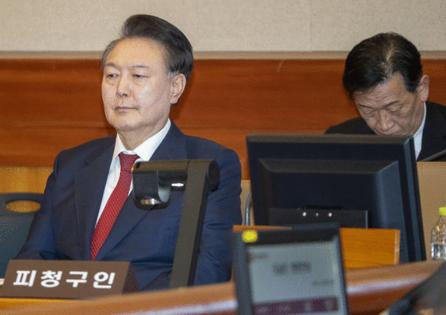South Korea court ousts President Yoon, triggering election
Published in News & Features
A South Korean court removed President Yoon Suk Yeol from office over his ill-fated martial-law declaration, paving the way for a presidential race to end a leadership vacuum that has gripped the nation for months.
The Constitutional Court’s unanimous ruling on Friday immediately stripped Yoon of his powers and set in motion a presidential election to take place within the next 60 days. Right now, Lee Jae-myung, the leader of the main opposition Democratic Party, is leading in polls as the top candidate to succeed Yoon.
“It is regrettable, but the People Power Party takes the decision of the Constitutional Court seriously and humbly accepts it,” said Yoon’s party leader Kwon Young-se, shortly after the verdict. Yoon’s office did not immediately respond to a call seeking comment. “We firmly believe that respecting this decision is the way to protect democracy and the rule of law,” Kwon said.
The court’s decision marks a potential conclusion to one of the most turbulent political chapters in South Korea’s recent history. The next leader will be tasked with handling a slew of challenges, including contending with Donald Trump’s escalated global tariff campaign and dealing with a more emboldened North Korea.
South Korea’s main equity benchmark Kospi fell after the ruling, erasing earlier gains of as much as 0.8%. The won slightly declined against the dollar.
In December, Yoon declared martial law, the first such order in South Korea in more than 40 years. He retracted the decree hours later after lawmakers voted it down, and the president was suspended from duties days later after parliament impeached him.
Yoon’s political gamble plunged South Korea into its worst constitutional crisis in decades, leaving the export-reliant nation without clear policy direction as Trump marched into a new stage in his tariff campaign. Prime Minister Han Duck-soo is currently acting president.
Yoon has denied any wrongdoing and said the martial-law decree was aimed at stopping the main opposition Democratic Party from paralyzing his administration. He now faces pending results of his criminal trial over the martial law decree, a process that has been ongoing independently of the Constitutional Court case.
Opposition leader Lee narrowly lost to Yoon in the 2022 presidential election. A landslide win for the Democratic Party in the April parliamentary elections gave him a strong tailwind for another run for the presidency.
“Our people have dramatically revived democracy in this land,” Lee said shortly after the verdict. “If we join forces, we can quickly restore the trust of the international community and turn the crisis into an opportunity.”
Under Lee, the Democratic Party has been looking to increase taxes on wealthy individuals and the chaebol conglomerates that dominate the country’s corporate landscape. He touts a more conciliatory approach to relations with North Korea, which might align with Trump if the U.S. leader seeks to revive diplomacy with North Korean leader Kim Jong Un.
Lee is more cautious about taking a hard line on China and pursuing closer relations with Japan, which could make coordination among the U.S. and its regional allies more challenging.
Other potential candidates to succeed Yoon include Kim Moon-soo, a labor minister in Yoon’s Cabinet, and Oh Se-hoon, the mayor of Seoul.
Whoever wins the presidential election, they will be inheriting an economy that faces multiple risks ahead. Trump’s unprecedented decision to slap tariffs across the world hit South Korea harder than most, especially among the U.S.’s security allies.
The White House is set to impose 25% tariffs on South Korea across the board from April 9, and has already implemented high levies on cars, steel and aluminum. Trump’s escalated tariffs and plans to bring more production back to the U.S. pose a risk to a range of South Korean companies deeply embedded in global supply chains, including Samsung Electronics Co., and automakers such as Hyundai Motor Co.
South Korea’s exports lost growth momentum in February, as demand for semiconductors weakened and chip shipments marked their first decline since late 2023. Semiconductors are South Korea’s biggest driver of earnings from abroad, and a key component of everything from consumer electronics to AI.
Yoon’s martial-law decree has also battered consumer confidence in South Korea. The central bank has been downgrading its economic forecasts for this year to account for the likely hits to growth, while also cutting its benchmark interest rate to try and shore up the economy.
(Jaehyun Eom, Yasufumi Saito and Paul Jackson contributed to this report.)
©2025 Bloomberg L.P. Visit bloomberg.com. Distributed by Tribune Content Agency, LLC.







Comments